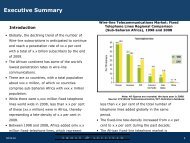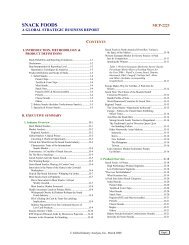the RUSSIA oil & gas competitive intelligence report - Report Buyer
the RUSSIA oil & gas competitive intelligence report - Report Buyer
the RUSSIA oil & gas competitive intelligence report - Report Buyer
Create successful ePaper yourself
Turn your PDF publications into a flip-book with our unique Google optimized e-Paper software.
Russia Oil and Gas Competitive Intelligence <strong>Report</strong> 2010<br />
In January 2009 Putin and Tymoshenko also agreed to eliminate RosUkrEnergo. This had been agreed<br />
before, in October 2008, so whe<strong>the</strong>r Naftogaz and Gazprom will from now on trade directly remains to be<br />
seen. RosUkrEnergo, which was created in 2004 to replace EuralTransGas as <strong>the</strong> intermediary to manage<br />
<strong>the</strong> <strong>gas</strong> trade between Turkmenistan and Ukraine, was established as a middleman between Gazprom and<br />
Naftogaz in January 2006 following <strong>the</strong> <strong>gas</strong> pricing dispute. A Swiss-registered monopoly JV,<br />
RosUkrEnergo, is 50% owned by Gazprom, with <strong>the</strong> remaining 50% owned by Raiffeisen Investment<br />
through its Swiss-registered Centra<strong>gas</strong> Holding, acting on behalf of a consortium of Ukrainian<br />
businessmen. RosUkrEnergo has certainly profited from <strong>the</strong> Russia-Ukraine <strong>gas</strong> trade, and Naftogaz will<br />
be hoping that that company's elimination will help its own balance sheets.<br />
Turkmenistan<br />
Relations between Ashgabat and Moscow have soured following a disagreement in April 2009 over an<br />
explosion on <strong>the</strong> pipeline that transports <strong>gas</strong> from Turkmenistan's Dauletabad field to Russia via<br />
Uzbekistan. The Turkmen government blamed Russia for unilaterally cutting <strong>the</strong> volume of deliveries<br />
through <strong>the</strong> pipeline without giving Turkmenistan due warning to relieve <strong>the</strong> extra pressure on <strong>the</strong> route,<br />
<strong>the</strong>reby causing a rupture. Moscow pinned <strong>the</strong> blame on technical problems on <strong>the</strong> Turkmen side, but<br />
Turkmen President Kurbanguly Berdymukhamedov has demanded an international investigation and has<br />
said he will seek compensation from Gazprom.<br />
Gazprom clarified its stance on <strong>the</strong> incident in June 2009, stating that it reduced <strong>the</strong> pipeline’s throughput<br />
by 80% after notifying Ashgabat that it could no longer take <strong>the</strong> normal volumes owing to <strong>the</strong> economic<br />
slump. In response to Russia’s cut in <strong>gas</strong> purchases, Turkmenistan has boosted its efforts to diversify its<br />
customer base, announcing plans to raise exports to Iran, launch a new <strong>gas</strong> pipeline to China and supply<br />
<strong>gas</strong> for <strong>the</strong> EU-backed Nabucco pipeline. Gas exports finally resumed in January 2010, under <strong>the</strong> terms of<br />
a new agreement signed in late December 2009, which provides for 30bcm of Turkmen <strong>gas</strong> to be<br />
exported to Russia in 2010 and annually to 2028. Volumes have been cut drastically from <strong>the</strong> 70-80bcm<br />
of exports envisioned under <strong>the</strong> countries' previous <strong>gas</strong> supply agreement, which was signed in 2003, and<br />
from <strong>the</strong> 50bcm that Turkmenistan exported to Russia in 2008.<br />
Uzbekistan<br />
Gazprom signed a one-year supply contract with Uzbekistan in December 2009. Under <strong>the</strong> new contract<br />
Gazprom will purchase 15.50bcm from Uzbekistan in 2010, up from 11.25bcm contracted in 2009. The<br />
deal was signed between Gazprom and Uztransgaz, <strong>the</strong> transportation and export unit of state-run <strong>gas</strong><br />
company Uzbekneftegaz. Although nei<strong>the</strong>r side has announced <strong>the</strong> price formula, Gazprom said that it<br />
will be in line with conditions in <strong>the</strong> European <strong>gas</strong> market. Following <strong>the</strong> deal, Gazprom's deputy<br />
chairman, Alexander Medvedev, said that <strong>the</strong> two sides had agreed to start preparation for a long-term<br />
contract. The current <strong>gas</strong> supply framework, signed in 2002, is due to expire in 2012.<br />
Poland<br />
Russian-Polish relations have often been fractious, although <strong>the</strong>y have improved slightly since 2009<br />
© Business Monitor International Ltd Page 15









